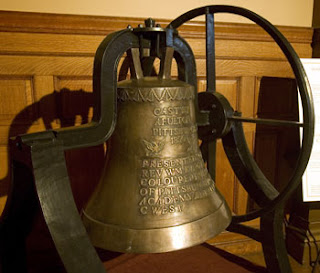
Did you ever wish you could go back in history just to see how people looked, and talked, and dressed, what they ate, etc? This book is the next best thing to a time machine; it provides the reader with a first-class ticket to observe the community of Buxton, Ontario in the 1850s. Buxton was (and is) a real town that was founded by and for newly-freed slaves, most of whom escaped from their American slave owners. (The photo to the left is of a replica of the Freedom Bell, which was rung each time a newly escaped slave experienced their first day of freedom by seeking refuge in Buxton.)
The people of the community come alive through the eyes and voice of Elijah, who has the honor of being the first child born into freedom. (He also holds a more dubious and disgusting honor of "anointing" famed abolitionist Frederick Douglass after he jiggled baby Elijah a little too emphatically after a feeding.) Elijah has been pegged as being a "fragile" boy - one whose tears and fears are always a little too close to the surface. As Elijah faces the challenges of adolescence, we get a fascinating, a very funny, glimpse into what it must have been like to grow up in a warm, supportive, rural community.
Curtis enhances Elijah's voice with plenty of humor (my favorite story involved Elijah's overwhelming fear of snakes), but the humor stops and real drama begins as Elijah travels to the American side of the river in order to attempt to retrieve stolen money that was to be used to buy a community member's still-enslaved family. Elijah's exploration of a seemingly-abandoned barn - and what he finds inside it - is both heart-stopping and heart-rending.
Read the novel "Elijah of Buxton" for the humor, the drama, and also for a fascinating glimpse into a group of people in the process of overcoming the physical and mental barriers to freedom.
Rated FIVE out of FIVE stars.

1 comment:
A definite read for those of us who are a little like Elijah. Everyone can relate to the antics and lessons learned, as well as the "fragileness" and bravery needed to live in 19th century America.
Post a Comment